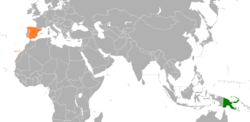Papua New Guinea–Spain relations
Papua New Guinea–Spain relations are the bilateral and diplomatic relations between these two countries. Spain and Papua New Guinea established diplomatic relations for the first time on August 28 of 1978[1] The Spanish representation was then established under the multiple accreditation regime and was based in Canberra (Australia). For the time being, the Government of Papua New Guinea commissioned, interimly, its high police station in Canberra, its affairs with Spain and for its accreditation in Madrid. Spain establishes diplomatic relations with Papua through the embassy of Canberra and the consulate of Sydney.[2]
 | |
Papua New Guinea |
Spain |
|---|---|
Historical relationship
There is hardly any data from Papua until the Europeans arrived at these islands in the 19th century. These lands received their name in this century: Papua comes from a word Malaysian that describes the curly hair of the Melanesians, New Guinea was the name that a Spanish discoverer, Yñigo Ortiz de Retez, granted by virtue of the memory he produced of the Guinean population in Africa.
Diplomatic relations
Spain and Papua New Guinea established diplomatic relations on August 28, 1978. There are no embassies residing in the respective capitals, which are governed by a multiple accreditation regime, from Canberra and Brussels respectively. Papua New Guinea is under the consular jurisdiction of the Consulate General of Spain in Sydney. In spite of the old historical ties - in 1545 the Spanish navigator Iñigo Ortiz de Retez explored the territory, calling the island “New Guinea”, because of the resemblance of that with the African coasts of Guinea -, the geographical distance explains the traditional low level of bilateral relations.[3]
Cooperation
Commercial interactions between PNG and Spain are framed within the general guidelines of the Community Economic Partnership Agreements (EPA) between the European Union and the Africa-Caribbean-Pacific (ACP) region.
In December 2009, the EU-Papua New Guinea Interim Economic Partnership Agreement was signed, which implies commitments by this country on duty-free and quota-free exports; Gradual and symmetrical opening of its market to community products, from an initial fourteen percent to eighty-eight percent in fifteen years, excluding meat, fish, fruits, vegetables, alcohol, tubes and iron. In addition, the Agreement requires compliance with Community regulations on technical barriers to trade and sanitary and phytosanitary measures. For its part, the European Union offers customs cooperation and better rules of origin for fishery products in Papua New Guinea and this country reserves the right to apply the necessary safeguard measures if the situation advises.
The EU Strategy 2008-2013 with respect to Papua New Guinea emphasizes poverty reduction and human, rural and environmental development, with a total budget of 142.3 million euros . The programmed activities include support for the traditional development plans, investments in infrastructure and communications and introduction of income generating activities, improvement of basic education and responsible management of natural resources.[4]
References
- El País Papúa-Nueva Guinea y España establecen relaciones diplomáticas plenas August 29, 1978
- Ficha de Papúa Nueva Guinea Office of Diplomatic Information. Ministry of Foreign Affairs and Cooperation. Representation Data
- Ficha de Papúa Nueva Guinea Office of Diplomatic Information. Ministry of Foreign Affairs and Cooperation. Diplomatic relations.
- Ficha de Papúa Nueva Guinea Office of Diplomatic Information. Ministry of Foreign Affairs and Cooperation. Cooperation.

.svg.png)